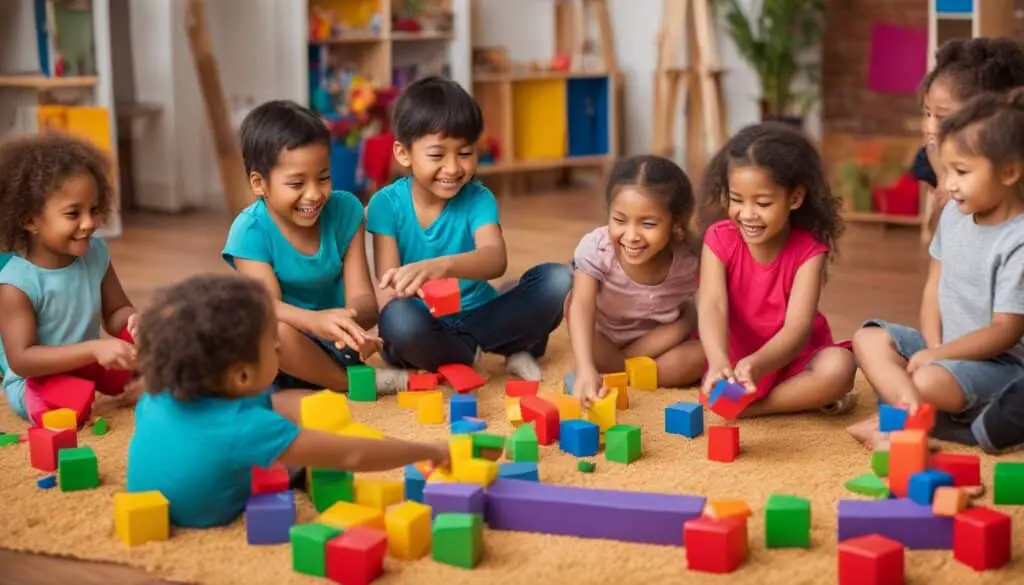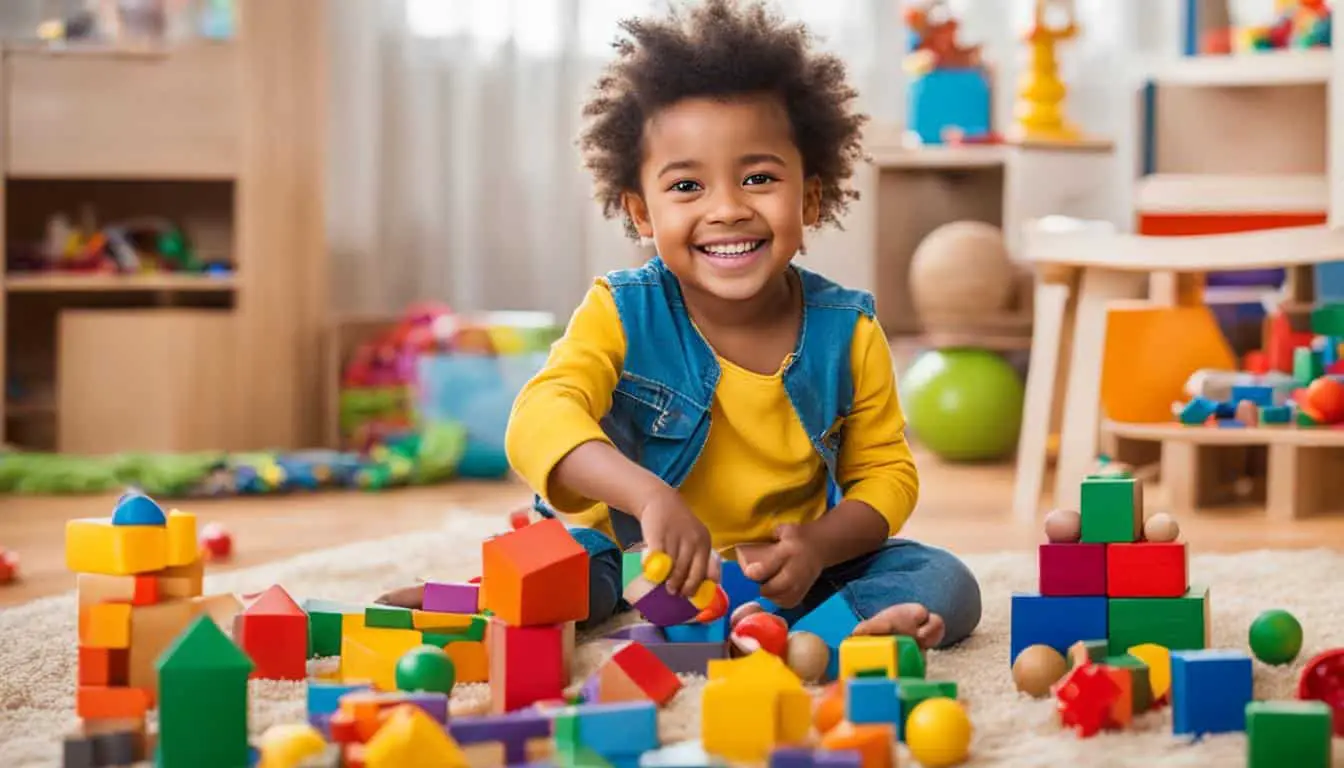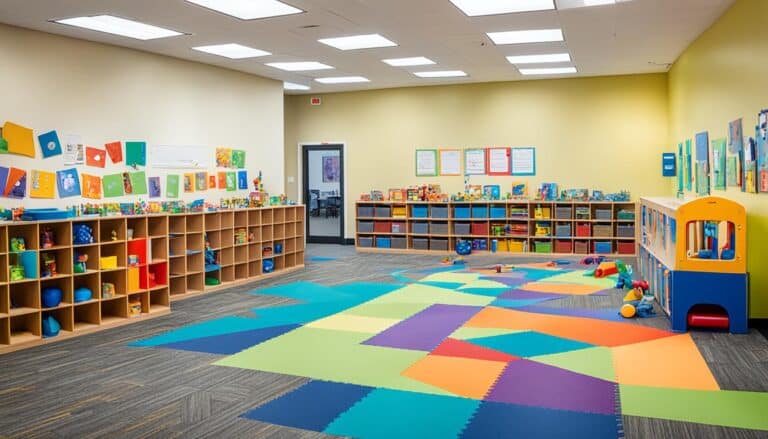The Importance of Play in Child Development
Play is a fundamental aspect of child development that significantly contributes to cognitive growth, social growth, and emotional growth. As a LCSW therapist and author of “Overcoming Your Child’s Fear of Dogs,” I understand how crucial play is for children to learn, explore, and develop essential skills. Whether it’s engaging in imaginative play, solving problems through interactive games, or socializing with peers, play provides a holistic approach to fostering healthy development in children.
Key Takeaways:
- Play is essential for cognitive, social, and emotional growth in children.
- Engaging in play-based learning promotes creative thinking, problem-solving, and imagination.
- Through play, children develop crucial social skills such as communication, cooperation, and conflict resolution.
- Play allows children to express and regulate emotions, fostering empathy and emotional well-being.
- Exposure therapy through play can help children overcome fears and phobias, such as the fear of dogs.
Cognitive Growth through Play
Play has a significant impact on cognitive development in children. It promotes creative thinking, problem-solving skills, and the development of imagination. Through play, children engage in activities that stimulate their brains and encourage them to explore new ideas and concepts. Play-based learning approaches, such as interactive games and puzzles, enhance cognitive development by allowing children to actively participate in the learning process and make connections between different concepts.
Children’s cognitive abilities undergo significant development during their early years. Play provides an ideal environment for them to exercise their mental faculties and develop crucial cognitive skills. Whether it’s building with blocks, solving puzzles, or engaging in imaginative play, children constantly use their brains to make sense of the world around them.
Creative thinking is a vital aspect of cognitive development, and play fosters this skill by providing children with opportunities to explore new ideas, experiment, and think outside the box. Whether it’s creating stories, role-playing, or inventing new games, children’s imaginations are unleashed during play, allowing them to express their creativity in diverse and exciting ways.
“Play is the highest form of research.” – Albert Einstein
Through play, children also develop problem-solving skills. They encounter various challenges and puzzles that require them to analyze, strategize, and come up with solutions. Whether it’s figuring out how to stack blocks to build a tower or finding the right pieces to complete a puzzle, children’s problem-solving abilities are continually exercised and strengthened through play.
Moreover, play-based learning is an effective approach to cognitive development as it actively engages children in the learning process. Rather than passively receiving information, children who engage in play-based learning actively participate, experiment, and discover new concepts on their own. This hands-on experience allows them to make meaningful connections and develop a deeper understanding of the subject matter at hand.
In summary, play is not just a form of entertainment for children; it is a powerful tool for cognitive growth. By promoting creative thinking, problem-solving skills, and imagination, play provides children with the necessary foundations for lifelong learning. With play-based learning approaches, children are able to actively engage in their own cognitive development, making connections, and exploring the world around them.
Social Growth through Play
Play is an essential component of a child’s social development. It provides valuable opportunities for children to acquire and refine important social skills, such as communication, cooperation, and conflict resolution. Through play, children actively engage with their peers, learning how to take turns, negotiate, and work collaboratively towards common goals. Social play enables children to develop empathy, understanding, and the ability to navigate social situations effectively.
During play, children engage in various interactive activities that promote social interaction and peer engagement. Through these experiences, they learn how to communicate their thoughts, ideas, and feelings effectively. Play allows children to practice important communication skills, such as active listening, expressing themselves clearly, and understanding non-verbal cues. These skills are crucial for healthy relationships and effective communication throughout their lives.
A significant aspect of social growth through play is the development of cooperation and teamwork skills. Children learn how to collaborate, delegate tasks, and work together towards shared goals. This promotes a sense of belonging and encourages a cooperative mindset, preparing children for future group situations and team environments.
Conflict resolution is another essential skill that children develop through play. They encounter situations where conflicts arise, and they must learn to navigate these challenges while considering the perspectives and needs of others. By engaging in play and encountering conflicts, children gain the necessary skills to resolve differences, negotiate compromises, and find mutually beneficial solutions.
“Play is the highest form of research.” – Albert Einstein
Peer interaction during play also plays a vital role in social growth. Through peer play, children learn how to interact with others, establish friendships, and navigate the complexities of social dynamics. Peer play provides opportunities for children to practice social skills, assert themselves, and develop self-confidence in their interactions with others.
Research has shown that children who engage in social play activities have improved social competence, better communication skills, and enhanced cooperation abilities compared to those who have limited play opportunities. Play provides a safe and supportive environment for children to experiment, learn from their experiences, and develop the social skills necessary for building healthy relationships and navigating the complexities of the social world.
Furthermore, incorporating play into educational settings can facilitate social growth. Play-based learning approaches create spaces where children can practice and apply their communication, cooperation, and conflict resolution skills in real-life situations. This enhances their readiness to interact and collaborate with others in diverse social contexts.

| Benefits of Social Growth through Play |
|---|
| Enhanced communication skills |
| Improved cooperation abilities |
| Development of conflict resolution skills |
| Strengthened empathy and understanding |
| Facilitated development of social competence |
Emotional Growth through Play
Emotional development is a crucial aspect of a child’s overall growth, and play plays a significant role in nurturing and enhancing emotional well-being. Through play, children have the opportunity to express their emotions freely, allowing them to develop important skills such as self-expression and emotional regulation.
During play, children engage in imaginative and pretend play, where they take on different roles and perspectives. This fosters empathy as they learn to understand and relate to the feelings and experiences of others. By stepping into different characters, children develop their capacity for empathy, which is essential for building meaningful relationships and navigating social interactions.
“Play is the highest form of research.” – Albert Einstein
Additionally, play therapy has proven to be an effective intervention for children facing emotional challenges. Play therapy provides a safe and supportive space for children to explore their emotions, process challenging experiences, and find healing. It allows children to express themselves through various play techniques, including art, puppets, and storytelling.
Take a look at the image below to gain a visual representation of the emotional growth facilitated through play:
By engaging in play therapy, children can learn coping strategies, develop resilience, and strengthen their emotional well-being. This therapeutic approach empowers children to better understand and regulate their emotions, leading to enhanced emotional intelligence and overall mental well-being.
The Benefits of Emotional Growth through Play:
- Promotes self-expression and emotional awareness.
- Develops empathy and understanding of others’ emotions.
- Builds emotional regulation skills and coping mechanisms.
- Encourages resilience and the ability to navigate challenging situations.
- Supports the healing process in children facing emotional difficulties.
Emotional growth through play is an integral part of a child’s overall development. It equips children with the necessary tools to manage their emotions, build meaningful relationships, and thrive in various aspects of life. Encouraging play-based activities and incorporating play therapy interventions can have a profound impact on a child’s emotional well-being and long-term happiness.
Play and Overcoming Fear
Fear of dogs, also known as cynophobia, is a common phobia among children. It can cause significant distress and impact their daily lives. However, play, particularly exposure therapy through play, offers a powerful tool in helping children overcome their fears.
Exposure therapy is a widely recognized treatment for anxiety disorders, including specific phobias like the fear of dogs. It involves gradually and safely exposing individuals to the feared object or situation, allowing them to build familiarity and reduce anxiety. Stefani Cohen, in her book “Overcoming Your Child’s Fear of Dogs,” outlines a step-by-step approach to expose children to real dogs, ultimately reducing their fear and resistance.
Through play, children can engage in exposure therapy in a relaxed and enjoyable way. They can interact with toy dogs, engage in role-play scenarios, or explore books and games about dogs. This exposure helps them become more comfortable with the idea of dogs and gradually reduces their fear.
Additionally, involving parents, mental health practitioners, and even therapy dog teams can further enhance the effectiveness of overcoming the fear of dogs through play. These individuals provide guidance, support, and reassurance throughout the process, creating a safe environment for children to work through their fears.
Benefits of Play and Exposure Therapy:
- Allows children to confront their fears in a controlled and supportive environment
- Builds resilience and self-confidence
- Fosters a sense of empowerment and mastery
- Encourages the development of coping strategies
- Promotes emotional regulation
Exposure therapy through play holds incredible potential in helping children overcome their fear of dogs. By leveraging the inherent joy and creativity of play, children can gradually face their fears, grow stronger, and reclaim their lives.
“Play gives children a chance to practice what they are learning.” – Fred Rogers
| Benefits of Exposure Therapy through Play: | Examples |
|---|---|
| Gradual exposure to dogs | Playing with toy dogs, interactive dog-themed apps or games |
| Development of coping strategies | Role-playing scenarios with dogs, using various strategies to overcome fear |
| Promotion of emotional regulation | Engaging in pretend play with dogs to express and manage emotions |
| Supportive environment | Parents, therapists, or therapy dog teams offering guidance and reassurance during play activities |
Play, combined with exposure therapy, empowers children to face their fears head-on. With dedication, support, and the joy of play, overcoming the fear of dogs is an achievable milestone on the path to a happier and more confident life.

Addressing Self-Confidence and Self-Worth through Play
Play can be a powerful tool in helping children develop self-confidence and self-worth. In cases of childhood emotional neglect, where a child’s emotional needs are not adequately met, self-esteem and belief in one’s abilities can be negatively impacted. Through play, children have the opportunity to explore their strengths, develop new skills, and experience a sense of accomplishment, all of which contribute to building self-confidence.
One effective method to enhance self-confidence through play is to provide individualized guidance and support. By offering personalized attention and encouragement during play activities, children can recognize their worth and value as individuals. This individualized approach helps children feel seen and understood, fostering a sense of self-worth that extends beyond the play session.
Play provides children with a safe space to discover their strengths, push their boundaries, and build self-confidence. When children receive individualized guidance and support during play, it reinforces their sense of self-worth and empowers them to overcome challenges.
Furthermore, play allows children to express themselves creatively and authentically, which nurtures a positive self-image and boosts self-esteem. Through various forms of play, such as imaginative play, arts and crafts, or sports, children can freely explore their interests and abilities, gaining a sense of mastery in their chosen activities.
Benefits of Addressing Self-Confidence and Self-Worth through Play
Engaging in play activities that target self-confidence and self-worth brings several benefits to children:
- Improved self-esteem: By participating in activities that showcase their abilities and strengths, children develop a stronger sense of self-worth and belief in their capabilities.
- Resilience: Through play, children learn to face challenges and setbacks, developing resilience and the belief that they can overcome obstacles.
- Emotional regulation: Play provides an outlet for children to express and regulate their emotions, contributing to emotional well-being and self-awareness.
- Interpersonal skills: By engaging in cooperative play and interacting with others, children enhance their communication, negotiation, and teamwork skills.
Overall, play allows children to cultivate a positive self-image, build self-confidence, and recognize their value as unique individuals. By providing individualized guidance and creating a supportive play environment, we can help children thrive emotionally, socially, and psychologically.
Self-Confidence and Self-Worth through Play: A Case Study
Let’s take a look at the experience of Mia, a 7-year-old girl who struggled with self-confidence due to emotional neglect during her early years. Mia’s parents enrolled her in a local theater program that encouraged imaginative play and self-expression.
Through her participation in the theater program, Mia discovered a passion for storytelling and performing. The supportive environment and individualized guidance provided by the theater staff allowed Mia to explore her creativity and develop her acting skills. As Mia gained confidence in her abilities, her self-esteem improved, and she started to believe in herself.
Benefits of Addressing Self-Confidence and Self-Worth through Play
| Benefits | Description |
|---|---|
| Improved self-esteem | Play activities that highlight children’s abilities and strengths foster a stronger sense of self-worth and belief in their capabilities. |
| Resilience | Through facing challenges during play, children develop resilience and the belief that they can overcome obstacles. |
| Emotional regulation | Play provides a space for children to express and regulate their emotions, contributing to emotional well-being and self-awareness. |
| Interpersonal skills | Engaging in cooperative play enhances children’s communication, negotiation, and teamwork skills. |
Enhancing User Engagement in Psychological Apps and Chatbots
User engagement plays a critical role in the success of psychological apps and chatbots. To ensure individuals interact actively and derive maximum benefit from these platforms, developers must incorporate features that increase engagement. The following elements contribute to a captivating user experience:
1. Appealing Visual Design and Easy Navigation
The visual design of the app or chatbot should be aesthetically pleasing and intuitive, making it easy for users to navigate and access desired features. Clear menus, logical organization of content, and visually appealing graphics enhance user engagement and encourage continued usage.
2. Goal Setting
Allowing users to set goals within the app or chatbot promotes a sense of purpose and progress. By helping individuals define their objectives and track their achievements, these platforms foster motivation and commitment.
3. Reminders and Feedback
“With personalized reminders and timely feedback, users stay engaged and motivated to continue their journey towards self-improvement.” – Dr. Rachel Spencer, Psychologist
Regular reminders and notifications help users stay on track with their goals, reinforcing their commitment to personal growth. Additionally, providing constructive feedback based on user data and performance can guide individuals in understanding their strengths and areas for improvement.
4. Personalized Feedback and Insights
Psychological apps and chatbots have the unique capability to gather and analyze user data, allowing for tailored feedback and insights. By providing personalized recommendations and actionable advice, these platforms empower individuals to gain valuable information about themselves and make informed decisions to support their well-being.
5. Friendly Tone in Interactions
Creating a friendly and approachable tone in the interactions between users and the app or chatbot is crucial in promoting user engagement. Using language that is warm, empathetic, and conversational can evoke a sense of trust and connection, leading to increased user participation.
6. Customizable and Accurate Notifications
The ability to customize notification settings gives users control over how and when they receive updates. Personalizing notifications ensures that users only receive relevant and timely information, preventing notification fatigue and enhancing user engagement.
7. Prioritizing User Agency
Designing the app or chatbot with user agency in mind allows individuals to navigate the platform according to their preferences. Offering options for customization and personalization empowers users to tailor their experience, increasing their sense of ownership and engagement.
| Features | Effect on User Engagement |
|---|---|
| Appealing Visual Design and Easy Navigation | Enhances user experience and encourages continued usage |
| Goal Setting | Promotes a sense of purpose and progress |
| Reminders and Feedback | Helps users stay motivated and committed to their goals |
| Personalized Feedback and Insights | Empowers individuals with valuable information about themselves |
| Friendly Tone in Interactions | Fosters trust, connection, and increased user participation |
| Customizable and Accurate Notifications | Prevents notification fatigue and promotes relevant updates |
| Prioritizing User Agency | Increases user engagement and sense of ownership |
Conclusion
Play is a fundamental component of child development, encompassing cognitive growth, social growth, and emotional growth. Through play, children have the opportunity to engage in activities that stimulate their minds, foster creativity, and encourage problem-solving skills. Additionally, play enables children to interact with their peers, develop essential social skills, and learn effective communication and cooperation. Moreover, play provides a platform for emotional expression, allowing children to explore their feelings and develop emotional regulation skills.
Furthermore, user engagement plays a significant role in the effectiveness and success of psychological apps and chatbots designed to support individuals in their self-development journeys. By incorporating features that enhance user engagement, such as personalized feedback and a friendly tone, developers can create platforms that facilitate cognitive growth, social growth, emotional growth, and overall well-being.
In conclusion, play is not just a form of entertainment for children; it is a crucial tool for their development. By recognizing the inherent value of play and promoting user engagement in psychological apps and chatbots, we can empower children with the skills they need to thrive in their cognitive, social, and emotional growth.
FAQ
Why is play important for child development?
Play is important for child development because it contributes to cognitive, social, and emotional growth. It allows children to learn, explore, and develop important skills. Play also helps children overcome fears and build resilience.
How does play promote cognitive growth in children?
Play promotes cognitive growth in children by promoting creative thinking, problem-solving skills, and the development of imagination. It stimulates their brains and encourages them to explore new ideas and concepts.
What role does play play in social growth?
Play plays a vital role in social growth as it provides opportunities for children to develop crucial social skills, such as communication, cooperation, and conflict resolution. It allows children to interact with their peers and learn to navigate social situations effectively.
How does play contribute to emotional growth and development?
Play allows children to express their emotions freely and develop emotional regulation skills. It fosters empathy and helps children develop understanding by engaging in pretend play and taking on different roles and perspectives. Play therapy, a form of therapy that uses play to express and process emotions, is also effective in promoting emotional healing and resilience.
Can play help children overcome their fears?
Yes, play, specifically exposure therapy through play, can help children overcome their fears. By gradually increasing their exposure to the fear-inducing stimuli, such as dogs, children can reduce their fear and resistance. This approach, highlighted in Stefani Cohen’s book “Overcoming Your Child’s Fear of Dogs,” is widely recognized as an effective treatment for anxiety disorders and specific animal phobias.
How does play address issues of self-confidence and self-worth in children?
Play allows children to explore their strengths, develop new skills, and gain a sense of accomplishment, which contributes to building self-confidence. Individualized guidance and support during play activities help children recognize their worth and value as individuals, addressing issues of self-confidence and self-worth.
How can user engagement be enhanced in psychological apps and chatbots?
User engagement in psychological apps and chatbots can be enhanced by incorporating appealing visual design, easy navigation, goal-setting, reminders, and feedback. Providing personalized feedback and insights based on user data, avoiding repetitive content, and maintaining a friendly tone in interactions with users contribute to sustained user engagement.
Source Links
- https://www.psychologytoday.com/nz/blog/animal-emotions/202401/how-to-overcome-childrens-fear-of-dogs
- https://www.psychologytoday.com/nz/blog/childhood-emotional-neglect/202310/4-major-life-struggles-caused-by-childhood-emotional
- https://www.psychologytoday.com/us/blog/urban-survival/202401/6-ways-to-improve-psychological-ai-apps-and-chatbots






